
Steeleye Span are an English folk rock band formed in 1969. Along with Fairport Convention, they are among the best known acts of the British folk revival, and were among the most commercially successful, thanks to their hit singles "Gaudete" and "All Around My Hat". They had four Top 40 albums and achieved a certified gold record with sales of "All Around My Hat".

Martin Carthy MBE is an English folk singer and guitarist who has remained one of the most influential figures in British traditional music, inspiring contemporaries such as Bob Dylan and Paul Simon, and later artists such as Richard Thompson, since he emerged as a young musician in the early days of the folk revival.

Ashley Stephen Hutchings, MBE, sometimes known in early years by his nickname, "Tyger" Hutchings is an English bassist, vocalist, songwriter, arranger, band leader, writer and record producer. He was a founding member of three noteworthy English folk-rock bands: Fairport Convention, Steeleye Span and The Albion Band. Hutchings has overseen numerous other projects, including records and live theatre, and has collaborated on film and television projects.

Below the Salt is the fourth studio album by Steeleye Span and their first after they joined the Chrysalis label. The album takes medieval influence and combines it with the band's British folk rock style. The lineup on the album includes Bob Johnson and Rick Kemp making their debuts in the band. By this point, Ashley Hutchings had left the band, leaving Tim Hart and Maddy Prior as the only remaining founding members.
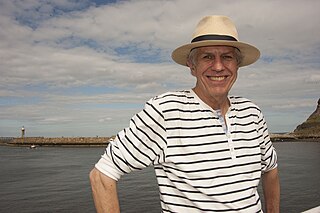
John Michael Kirkpatrick is an English player of free reed instruments.
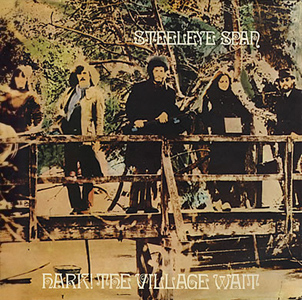
Hark! The Village Wait is the debut album by the British folk rock band Steeleye Span, first released in 1970. It is the only album to feature the original lineup of the band as they broke up and reformed with an altered membership immediately after its release, without ever having performed live. Therefore, it is one of only two Steeleye Span studio albums to feature two female vocalists, the other being Time (1996). A similar sound was apparent years later when Prior teamed up with June Tabor to form Silly Sisters. Overall, the album's sound is essentially folk music with rock drumming and bass guitar added to some of the songs. The banjo features prominently on several tracks, including "Blackleg Miner", "Lowlands of Holland" and "One Night as I Lay on My Bed".

Please to See the King is the second album by Steeleye Span, released in 1971. A major personnel change following their previous effort, Hark! The Village Wait, brought about a substantial change in their overall sound, including a lack of drums and the replacement of one female vocalist with a male vocalist. The band even reprised a song from their debut, "The Blacksmith", with a strikingly different arrangement making extensive use of syncopation. Re-recording songs would be a minor theme in Steeleye's output over the years, with the band eventually releasing an entire album of reprises, Present – The Very Best of Steeleye Span.
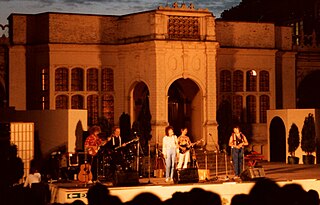
The Albion Band, also known as The Albion Country Band, The Albion Dance Band, and The Albion Christmas Band, were a British folk rock band, originally brought together and led by musician Ashley Hutchings. Generally considered one of the most important groupings in the genre, it has contained or been associated with a large proportion of major English folk performers in its long and fluid history.

Now We Are Six is an album by the British folk rock band Steeleye Span. Its title refers to both its sequence among their albums, and the band's size, in light of the addition of drummer Nigel Pegrum. It reached number 13 in the UK albums chart.
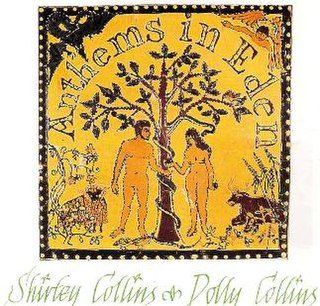
Anthems in Eden is a 1969 album by Shirley and Dolly Collins, with the Early Music Consort of London, directed by David Munrow. The album originally consisted of a 28-minute set of folk songs plus seven other individual pieces performed by the same group. The musical arrangements for these eight pieces included early music instruments, such as viols, recorders, sackbuts and crumhorns. In 1976, six new songs were recorded with a different assortment of accompanists, to replace the original seven individual songs. This 1976 album consisting of the 28-minute set plus the six new songs was released by Harvest Records under the title Amaranth. Subsequent releases have combined all fourteen pieces under the original title, Anthems in Eden.

Storm Force Ten is an album by British folk rock band Steeleye Span, the band's 10th effort, released in 1977.

Live at Last is a live album by the British folk rock band Steeleye Span. It is the first live album the band issued, after eight years of performing and releasing 10 studio albums. It was originally intended to be a farewell album. "This then is our eleventh and final album. Steeleye Span amicably disbanded five days after making this recording for reasons that are irrelevant here.”

Sails of Silver is an album by British folk rock band Steeleye Span.
Gay Woods is an Irish singer. She was one of the original members of Steeleye Span.
B&C Records was a British record label run by Trojan Records' owner, Lee Gopthal. It existed primarily between May 1969 and September 1972.
The Etchingham Steam Band were a folk group formed by Ashley Hutchings and Shirley Collins in England in 1974 after the Albion Country Band had disbanded in late 1973. They were named after village Etchingham in Sussex where Hutchings and Shirley Collins, his then wife, were living. The band's name was a reference to their acoustic nature, formed during a time of power cuts in the mid-1970s that caused problems for any band using electrical instruments or amplification.

Shearwater is an album by Martin Carthy, released in 1972 on the Pegasus label as PEG12. It was re-released on vinyl in 1973/74 by Mooncrest as CREST25. The album was re-issued on CD in 1995, by Mooncrest, as CRESTCD 008 and then again, in March 2005 by Castle Music, as CMQCD1096.
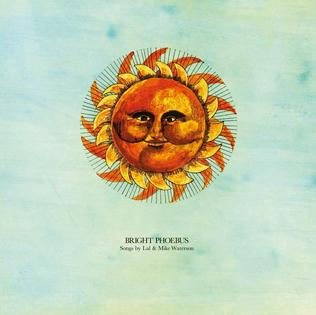
Bright Phoebus, fully titled Bright Phoebus: Songs by Lal & Mike Waterson, is a folk rock album by Lal and Mike Waterson. It was recorded in May 1972 with musical assistance from various well-known members of the British folk rock scene. The album failed to make an impact on its original release, but it was subsequently championed by many musicians, including Billy Bragg, Arcade Fire, Richard Hawley and Jarvis Cocker. For years the album was difficult to obtain but in 2017, a re-release of Bright Phoebus was announced.

Sweet Wivelsfield is an album by Martin Carthy, released in 1974. It was re-issued by Topic Records on LP in 1981 and on CD in 1996.

















